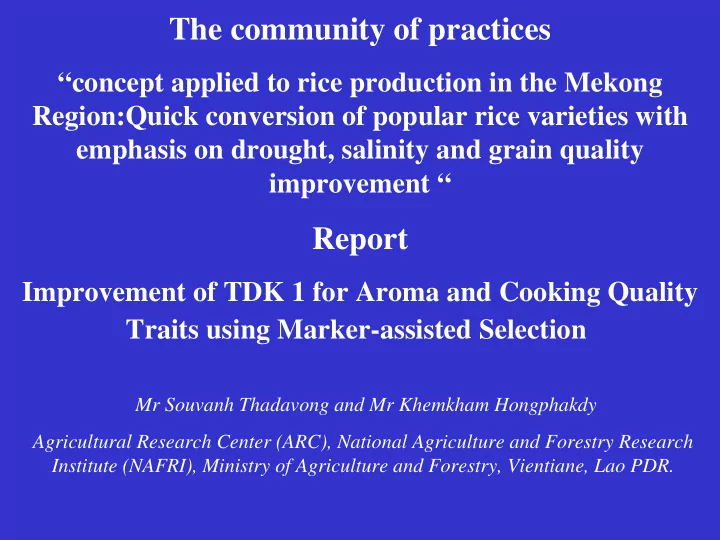

The community of practices “concept applied to rice production in the Mekong Region:Quick conversion of popular rice varieties with emphasis on drought, salinity and grain quality improvement “ Report Improvement of TDK 1 for Aroma and Cooking Quality Traits using Marker-assisted Selection Mr Souvanh Thadavong and Mr Khemkham Hongphakdy Agricultural Research Center (ARC), National Agriculture and Forestry Research Institute (NAFRI), Ministry of Agriculture and Forestry, Vientiane, Lao PDR.
Introduction • Rice is a staple food in the Lao PDR. • Approximately 95% of population consume glutinous rice. • Thadokkham 1 (TDK 1) is one glutinous improved variety which was released by National Rice Research Program since 1993. • Up to now TDK1 grow in a large areas • This variety give high yielding and good eating, but not aroma, therefore TDK 1 need to be improved for aroma trait.
Objective This study aim to improve TDK 1 with aroma trait by using Marker Assist Selection. Plant material The marker assisted backcross breeding is conducted using TDK1 which is popular and grow in large area of the country, use as a recipient and local variety (Homnangnouane) with aroma, use as a donor Recipient: TDK 1 (Glutinous rice) Donor: Homnangnouane ( Glutinous and aroma rice)
Plant material (Cont.) From BC2F2 we produced 6 BC3F1 plants in NAFRI and 94 plants BC3F1. The whole of BC3F1 plant were bring to MAS workshop for select heterozygous trait using marker-assisted selection. BC2F2 x TDK1 BC3F1 MAS TDK1+Sub1 BC3F1 x Figure 1 : Diagram of marker-assisted backcross breeding of TDK1
Methodology •1. DNA extraction •2. DNA concentration • 3. PCR applification 4. Lines selection Every step follow LAB MANUAL of this workshop. Parental Polymorphism Survey BADH marker were used for parental polymorphism survey
Marker Assisted Selection for F1 The Methodology: DNA extraction, DNA concentration, PCR amplification and Lines selection The objective of F1 screening is focused on selected plants which carried heterozygous alleles of Homnangnouane DNA of F1 progenies concentration
The polyacrylamide gel of F1 genotyping with BADH
Marker Assisted Selection for F1 Among 96 selected plants of F1, 45 plants carried heterozygous of F1 plants Marker DNA Marker DNA sample BADH sample BADH No No 1 3 2 15 19 2 2 4 2 16 20 2 3 6 2 17 21 2 4 7 2 18 23 2 5 8 2 19 24 2 6 9 2 20 25 2 7 11 2 21 27 2 8 12 2 22 28 2 9 13 2 23 32 2
DNA sample Marker BADH No 29 59 2 30 71 2 31 72 2 32 73 2 33 74 2 34 75 2 35 76 2 36 77 2 37 78 2 38 82 2 39 83 2 40 84 2 41 85 2 42 89 2 43 90 2 44 92 2 45 93 2
Conclusion •The study aims to improve TDK1 with aroma and good eating quality by MAS. • From 96 plants of F1, we got only 45 plants of heterozygous of Homnangnouane. • Ten plants selected from 45 plants of heterozygous of Homnangnouane will be continue to crossing with TDK1+Sub1. • In addition, we learn more about Waxy, PB7-8( bacterial leaf blight), SNPs 2341 ( Single Nuclear Type Polymorphism), Gelatinization Temperature (GT), Gel Consistency (GC), Amylose Content (AC) and understand that the MAS method is very helpful, exactly identify and quick technique for breeding program.
Acknowledgement We would like to thank to sponsor’s projects: • the Generation Challenge Program (GCP) • BIOTEC • Kasetsart University Especially, we would like to thank: Dr. Apichart Vanavichit and Dr. Teerayut Toojinda, who give opportunity to participate in this course, advice technology of Bio-Technology and transfer knowledge for us. Finally, we would like to thank all teachers and all staffs in Rice Gene Discovery Unit to provide and help during the work shops.
Recommend
More recommend